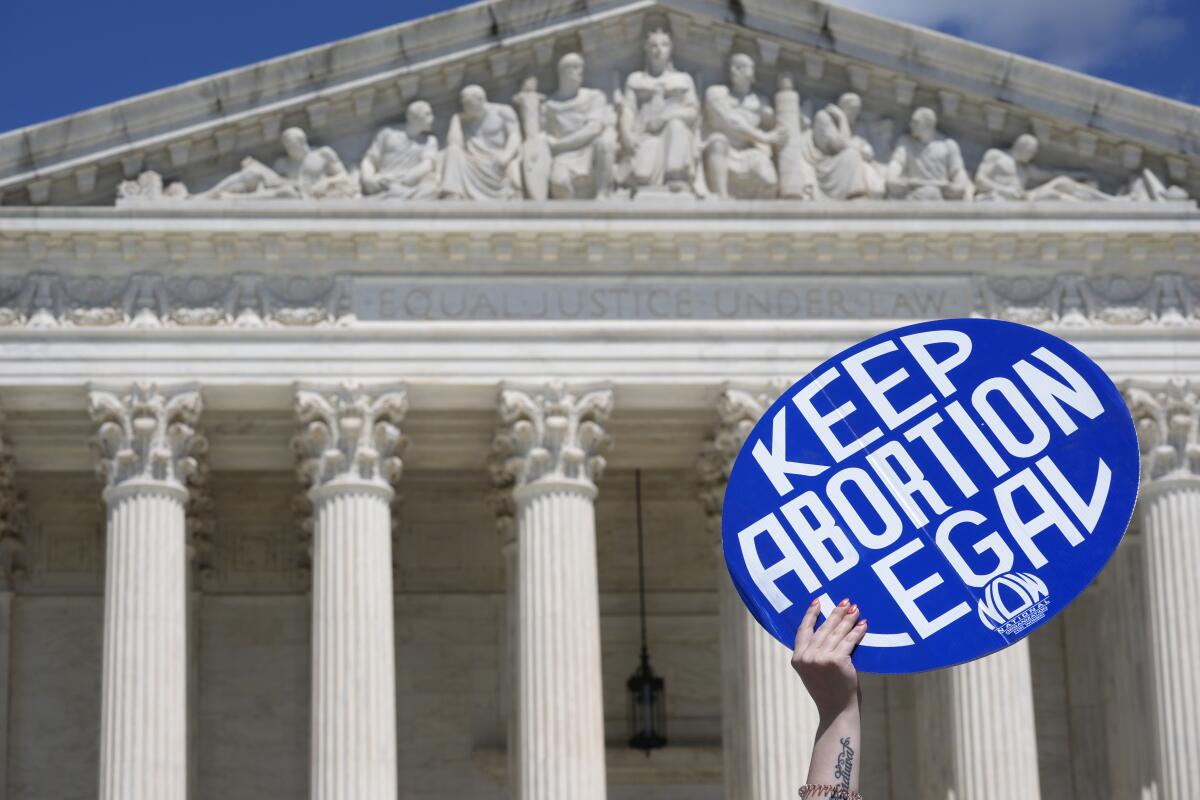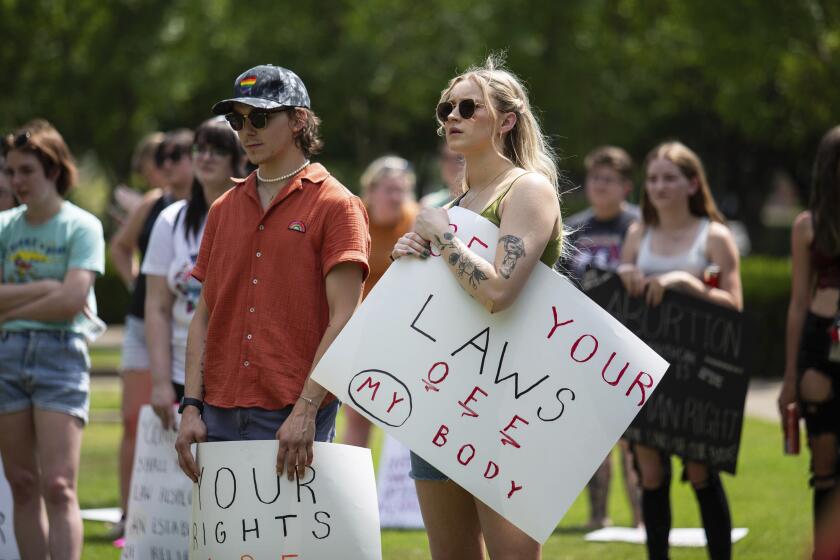Editorial: November election could make — or break — reproductive freedom

- Share via
“Our bodies are on the ballot!”
Alexis McGill Johnson, the president and chief executive of Planned Parenthood Action Fund, got it right when she declared that during her speech at the Democratic National Convention on Wednesday.
There’s no question that the right to control your own body should be on the minds of every voter in the November election. Kamala Harris has made the aggressive defense of reproductive rights a main goal of her vice presidency, and Donald Trump’s three antiabortion appointments to the Supreme Court helped overturn Roe vs. Wade.
But abortion access has been making its way onto state election ballots ever since the Supreme Court took away the federal constitutional guarantee to that right in its 2022 ruling in Dobbs vs. Jackson Women’s Health Organization. And in every case, voters have supported ballot measures guaranteeing a right to an abortion while defeating those that would have constitutionally outlawed it, even in conservative-leaning states. Voters understand the danger of repressive state bans on abortion that intimidate healthcare providers into not performing emergency abortions until women are critically ill.
The GOP stance is alienating key voters, including Republican women. Punting the issue to the states has led to ballot measures that could drive turnout for Democrats.
That’s why it’s impressive and exhilarating to see, with each passing election cycle, guarantees of reproductive freedom established from state to state. Legislators should never be able to dictate when and if a woman decides to have a baby.
This year there are 10 states with abortion rights measures on their ballots. And some of those measures are desperately needed. Nearly half the nation is now a patchwork of abortion bans. There are 14 states that ban abortion with limited exceptions. Eight other states ban the procedure somewhere between six weeks of gestation (when women usually don’t even know they are pregnant) and 18 weeks.
Measures on November ballots would restore access to abortion in Missouri, South Dakota and Florida — where there is none or little — to the point of viability, or about 24 weeks. In Arizona, where abortion is banned after 15 weeks, a measure would extend the right to the point of viability. In Nebraska, voters will choose between two opposing constitutional amendment proposals. One would protect the right to an abortion in the state until viability (it is now allowed up to 12 weeks of gestation), and the other would prohibit abortion after the first trimester.
During election season, expect to hear Republicans peddle falsehoods about abortion to discredit it and demonize the people who provide or support it.
Measures in Colorado, New York, Maryland, Montana and Nevada — where abortion is either allowed up to 24 weeks of viability or limits are not specified — would solidify the right to abortion in their state constitutions.
Previously, voters in California and Vermont, where abortion was already protected, added the right to their constitutions in 2022 — as did those in the state of Michigan. That year Kansas and Kentucky voters turned back antiabortion measures. Ohio passed a measure in 2023 including abortion rights in its state constitution.
At both state and national levels, support for abortion rights is only getting more forceful and unapologetic. As well it should. A Pew Research Center poll says most adults — 63% — in the U.S. believe abortion should be legal in all or most cases. That number goes up to 86% for religiously unaffiliated Americans. Even 59% of Catholics think it should be legal.
Vance is on a mission to alienate every bloc of female voters: ‘childless cat ladies’ and postmenopausal women especially.
It’s also encouraging that reproductive rights figured so prominently at the Democratic National Convention. In front of millions of Americans, women told their stories of struggling to get an abortion when they desperately needed one. Oprah Winfrey reminded the audience that if you do not have control over how and when you have children, “there is no American dream.”
And Harris talked of hearing women’s stories of miscarrying in parking lots, developing sepsis and losing the ability to have children again because restrictions on when emergency abortions are permitted make doctors “afraid they may go to jail for caring for their patients.” She noted that “America cannot truly be prosperous unless Americans are fully able to make their own decisions about their own lives.” We agree.
Reproductive freedom is about having the power to make choices. And that is something that we must vigilantly work for and protect at all levels of government.
More to Read
A cure for the common opinion
Get thought-provoking perspectives with our weekly newsletter.
You may occasionally receive promotional content from the Los Angeles Times.













